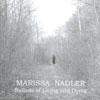 I thought I'd right a wrong here by reviewing Marissa Nadler's debutalbum, which I completely overlooked upon its release last year. Ballads of Living and Dying is unmistakably the same voice and sensibility as that on Mayflower May, but without the conceptual trappings, there are a greater variety of approaches to be found on the record.
I thought I'd right a wrong here by reviewing Marissa Nadler's debutalbum, which I completely overlooked upon its release last year. Ballads of Living and Dying is unmistakably the same voice and sensibility as that on Mayflower May, but without the conceptual trappings, there are a greater variety of approaches to be found on the record.Eclipse
The songs on Marissa's debut makegreater use of studio effects, with liberal vocal processing and amyriad of electric guitar effects, including an e-bow which is used tohaunting effect on several of the album's best tracks. On the whole,this album is darker and more psychedelic than Mayflower May,which I suspect might have greater appeal to listeners approaching thismaterial from the standpoint of classic 1960s psych folk like TheTrees, Fairport Convention and Mellow Candle. Nadler's vocals on thisalbum seem even a bit more dramatic and affected than on her sophomorerelease, especially when she tackles a pair of tracks adapted fromother writers' works, using her voice cannily to reshape the words inorder to fit her familiar melodic, cyclical fingerstyle. "Hay TantosMuertos" utilizes words by Chilean poet Pablo Neruda, and the album'sfinal track adapts Edgar Allan Poe's famously lyrical death ballad"Annabelle Lee" into a chilling slice of haunted psychedelia with anatmosphere inexplicably resembling Dark Side of the Moon-eraFloyd. Nadler's spooky evocation of Civil War-era balladry is inevidence on the track "Box of Cedar," where a soon-to-be war widowbemoans and celebrates her husband's certain fate: "I'm gonna telleverybody I know that I'm glad to see you/You know you're coming homein a box of cedar." Populating the album are a similar cast ofcharacters from the second album, including Mayflower May herself, thelonely ghost of a spoilt and slain maiden who wanders the woods"Without a lover/Without a friend/Without a savior," Nadler sadlyimploring: "And if you see her/Call out her name/And if you hearher/Out in the rain/Mayflower May Belle was her name." The addition onseveral tracks of auxiliary instrumentation including banjo, accordionand organ contributes to a slightly more eclectic sound that stands incontrast to Mayflower May's limited palette. As with the secondalbum, after repeat listens, the strongest aspects are once again thedeceptive simplicity of the songs and the strength of Marissa'sseductively haunting vocals. I could well imagine eventually growingtired of the rather trite stylistic conceit of Marissa Nadler's morbidpsych-folk, but I don't think I'd ever tire of hearing her voice. Infact, I would probably be happy listening to her recite the phone book.
samples:
Read More

